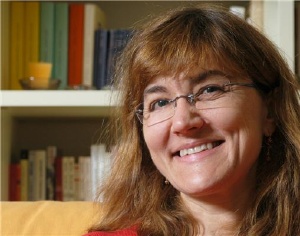Jul 9 2009
Kristina Djinovic-Carugo, Head of the Department of Structural and Computational Biology at the Centre for Molecular Biology at the University of Vienna (Max F. Perutz Laboratories), is one of the eight women receiving a "Laura Bassi Center of Expertise". This initiative of the Ministry of Economy, Family and Youth was created to promote outstanding female researchers. In her project, Djinovic-Carugo and her project partners focus on the development of new methods of protein production for the high-quality demands of structural and functional analysis of proteins to investigate their role in disease and therapy.
 Kristina Djinovic-Carugo
Kristina Djinovic-Carugo
Proteins are macromolecules involved in all major cellular functions. They act as molecular "machines", and are responsible for important processes such as nutrient transport, muscle contraction, cell division and signal transduction, but are also involved in diseases. To fully understand their function, the investigation of their three-dimensional structure is combined with functional studies. These studies demand a very high quality of the investigated protein. Only a high amount of pure protein samples lead to revealing results. "Production and purification of the protein on the one hand, but also finding the perfect conditions for crystallisation on the other hand require time and labour intensive experiments", says Kristina Djinovic-Carugo, Professor for Structural Biology at the University of Vienna and Head of the Laura Bassi Center for Optimised Structural Studies (COSS).
Accelerated production and crystallisation of proteins
Djinovic-Carugo of the Max F. Perutz Laboratories and her COSS project partners Peggy Stolt-Bergner and Jan-Michael Peters of the Research Institute of Molecular Pathology (IMP) and Markus Hanner of the Intercell AG, all located at the Campus Vienna Biocenter, focus on the development of new methods to accelerate the screening and production of proteins in the quality and quantity required. Peggy Stolt-Bergner, IMP: “In our approach, we already screen for mutations on the DNA level, smaller and bigger pieces of DNA, of which the most appropriate will then lead to more stable proteins with a higher propensity to crystallise." The resulting proteins are then tested in a small-scale microfluidic crystallisation set-up, with only 2 microlitres of protein used for the testing of 100 crystallisation conditions varying in time, temperature and acidic components. The narrowed down protein candidates are then tested in "large-scale", which means that 20 microlitres per 100 conditions are pipetted by a Nano-Robot to find the perfect condition to produce the aimed protein for all further experiments. With this set-up, the researchers hope to reduce significantly the amount of time necessary for the production and crystallisation of proteins.
Marketable options of the "Laura Bassi Centers of Expertise"
The "Laura Bassi Centers of Expertise" also aims at the development and preparation of marketable goods. "In the long-term, we could offer platform and methodologies to complement a recently planned Campus-wide traditional protein purification facility for external researchers and campus members", explains Kristina Djinovic-Carugo one of the options to benefit from the COSS project. Not only structural biologists need proteins in such a high and pure quality, they are also essential for biochemical and functional experiments. Another option to benefit from this protein production method is relevant for the project partner Intercell AG, a vaccine company: knowing protein structures and functions in cells serves for the development of therapeutic drugs.